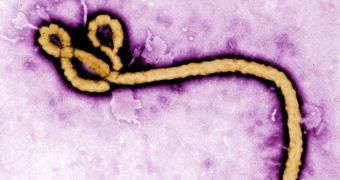This August 8, the World Health Organization (WHO, for short) issued a statement saying that West Africa's Ebola outbreak was an “extraordinary event” and a threat to international public health.
In a press release on its website, the Organization explains that the outbreak debuted back in December 2013, in Guinea. Since then, dozens of cases of Ebola Virus Disease have been documented in Liberia, Nigeria, and Sierra Leone.
Since the virus first struck until August 4, a total of 1,711 cases of people infected with this virus were reported in the aforementioned four countries in West Africa, the World Health Organization details.
Of these, 1,070 were confirmed to be instances of Ebola Virus Disease, and as many as 932 resulted in death. In light of these figures, specialists say that the ongoing Ebola outbreak in West Africa is the largest to date.
According to experts with the World Health Organization, the Ebola virus came to infect this many people in Guinea, Liberia, Nigeria, and Sierra Leone due to the fact that these countries are not yet prepared to handle such events.
“Their health systems are fragile with significant deficits in human, financial and material resources, resulting in compromised ability to mount an adequate Ebola outbreak control response,” the World Health Organization writes.
“Inexperience in dealing with Ebola outbreaks; misperceptions of the disease, including how the disease is transmitted, are common and continue to be a major challenge in some communities,” the Organization goes on to explain.
The fact that people in this part of the world travel outside their home country on a regular basis is believed to have also had a say in the matter. Thus, travelers carrying Ebola are believed to be the ones to blame for the spread of the virus.
It is precisely because Guinea, Liberia, Nigeria, and Sierra Leone are having trouble keeping the outbreak under control that the virus is considered an international threat. Thus, the weak health systems in these countries, coupled with the virulence of the virus, could lead to a global epidemic.
“Inexperience in dealing with Ebola outbreaks, and misperceptions of the disease, including how the disease is transmitted, are common and continue to be a major challenge in some communities. A coordinated international response is deemed essential to stop and reverse the international spread of Ebola,” the Organization says.
Specialists say that, in order to stop the virus from spreading to other countries in West Africa, possibly even to other continents, efforts must be made to quickly identify cases of Ebola Virus Disease and place the people affected by this condition in isolation.
What's more, they say that people coming into contact with Ebola Virus Disease patients while not wearing protective equipment should not be allowed to travel either nationally or internationally for at least 21 days following the exposure. Interestingly enough, World Health Organization argues that probable and suspect cases should also be placed in isolation.
Mass gatherings should not take they place in regions where the presence of the virus has been documented, and high officials should see to it that the people killed by this diseases are buried by well-trained personnel to avoid any further infections.
“The scale of the Ebola outbreak, and the persistent threat it poses, requires WHO and Guinea, Liberia and Sierra Leone to take the response to a new level, and this will require increased resources, in-country medical expertise, regional preparedness and coordination,” Dr. Chan, the current director general of WHO, has commented on this outbreak in a recent statement.

 14 DAY TRIAL //
14 DAY TRIAL //